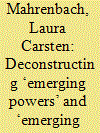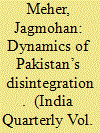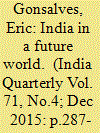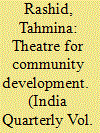|
|
|
Sort Order |
|
|
|
Items / Page
|
|
|
|
|
|
|
| Srl | Item |
| 1 |
ID:
142006


|
|
|
|
|
| Summary/Abstract |
Academic literature and the media offer a variety of monikers for emerging states like Brazil, India and China, most prominently, ‘emerging powers’ and ‘emerging markets’. This article argues the terms used to describe these states create assumptions about their behaviour in global governance (GG). In order to accurately assess the impact of emerging states on international institutions, it is necessary to more systematically examine their current participation in GG. Does the use of power and economic interests in GG negotiations distinguish emerging states from traditional powers, as the ‘emerging’ part of these terms suggests? And can the content of GG negotiations predict the dominance of each factor, as implied by the ‘power/market’ part? This article tackles these questions by comparing the behaviour of one emerging state (India) and one traditional power (the United States) in negotiations at the World Trade Organisation and the United Nations Security Council. The results demonstrate that, while there is clearly something distinctive about at least India’s participation in GG, focussing on power or economic interests alone is insufficient to explain that distinctiveness or its implications for relations between rising and traditional powers in GG.
|
|
|
|
|
|
|
|
|
|
|
|
|
|
|
|
| 2 |
ID:
142003


|
|
|
|
|
| Summary/Abstract |
This article attempts to answer two questions: (a) what led to the psychological fissure of the East Pakistanis? And (b) how did the psychological fissure culminate into their physical separation? To answer the first question, the study examines six variables of perpetual antagonism between East and West Pakistan, that is, geographical absurdity, constitutional confusions and military takeover, economic disparity, language issues, political factionalism and military dynamics, and establishes that the conjuncture of all these factors (rather than the role of India or outside actors which have often been exaggerated ignoring the internal dynamics) constituted the dynamics of Pakistan’s disintegration in 1971. Then it discusses West Pakistan’s genocide against the East Pakistanis and the Indian intervention as immediate factors for Pakistan’s physical separation. The study finds that the Indian action reinforced the existing variables, accelerated the creation of Bangladesh and ended civil strife. Paradoxically, outside actors such as the United States, Soviet Union and China had only a limited impact on the sources and escalation of the East–West divide. The lessons of 1971 are relevant for the inner workings of federalism, especially with disconnected geographical boundaries.
|
|
|
|
|
|
|
|
|
|
|
|
|
|
|
|
| 3 |
ID:
142004


|
|
|
|
|
| Summary/Abstract |
Contrary to mainstream thinking, the existence of diversity does not necessarily condemn a state to instability and chaos. In fact, difference is a good ingredient for progress because each group contributes its unique experiences and peculiar qualities to the cause of a nation. To produce crisis, diversity must be worked on or manipulated. With a view to gaining deeper understanding of the factors that impact on identity diversity to create conflict in Nigeria, a number of conflict theatres in the country were examined. Having explored each case, the article notes that the policies of the colonial state, that emphasised group differentiation, laid the foundation for identity conflicts. The post-colonial state is just as guilty. Its administrative arrangement for managing diversity, the federal character principle (FCP), has failed to exploit the country’s diversity to produce development. Instead, it has deepened the isolation of certain groups, thus, inhibiting national integration. Added to the deliberate manipulation of diversity for personal interests by the political class, the incidence of identity conflicts in the country can be explained. Going forward, the author stresses the need to review the FCP and close all loopholes in its enabling laws that allow for easy misinterpretation and deliberate misapplication.
|
|
|
|
|
|
|
|
|
|
|
|
|
|
|
|
| 4 |
ID:
142002


|
|
|
|
|
| Summary/Abstract |
A forecast of the global scenario a decade hence is attempted, and the policies India should follow to gain the most advantage are suggested. The nation state system will continue, but there will be major and continuing change in the capacity and power projection of more important states and hence in their relationship. Power in all aspects will shift from the Atlantic powers to Asia and the Indian Pacific Ocean Region resulting in a multipolar system. To manage this better Asia needs to establish a regional cooperation structure. China has emerged as the single most powerful country in Asia, and the current leadership is seeking to put its own model in place. India can and should ensure a leading role for itself by becoming the most effective power in the South Asian and Indian Ocean region. For this it will have to forge a working partnership with China which will not exclude an element of competition. The boundary problem needs to be resolved. The relations with Pakistan must be managed. Relations with all other neighbours must be improved as speedily as possible. The USA will still remain the single most powerful country and close bilateral relations are crucial even while independence is not surrendered. The growing conflicts in the Middle East and the flux in supply and prices of energy need to be addressed. Enhancing domestic capacity will power India’s external projections. The demographic dividend can only be harvested by a determined pursuit of skills innovation and technology to attain excellence in economic production and social goals. This is only possible in a democracy if it moves towards greater inclusion and provides opportunity to all. Success will ensure India becomes a major global power by 2025.
|
|
|
|
|
|
|
|
|
|
|
|
|
|
|
|
| 5 |
ID:
142005


|
|
|
|
|
| Summary/Abstract |
Street theatre has always been a significant feature in the lives of rural communities as the only source of entertainment especially in the post-harvest season. In many parts of South Asia and Africa, it has been increasingly utilised as an awareness raising and development tool by civil society and development organisations. This paper would explore street theatre in the context of Pakistan, where it has been revitalised by organisations like Lok Rahs and Ajoka. Lok Rahs has primarily focused on the needs of rural communities and remains committed to their concerns regarding health but also human rights especially women and the disadvantaged. Ajoka, on the other hand, is a professional organisation, performing in formal as well as informal settings, focusing on socio-political concerns as well as human rights issues. This article would examine the contributions of both the groups in the broader context of feminist movement in Pakistan, looking at their role as change agents in the development of rural communities in Punjab province.
|
|
|
|
|
|
|
|
|
|
|
|
|
|
|
|
|
|
|
|
|